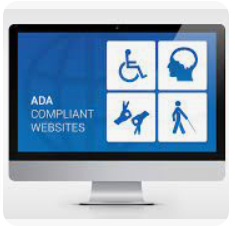![]()
The ADA and Your Websites

Much has been happening recently on the issue of accessibility in the area of business websites. In August of 2022, the California Court of Appeals ruled in the case of Martinez v. Cot’n Wash, Inc. that websites are not “public accommodations” covered under the Americans with Disabilities Act (consistent with the U.S. Court of Appeals for the Ninth Circuit). But their ruling only directly applied to “online-only” retailers. Earlier in the year, the Eleventh Circuit Court of Appeals ruled against Winn Dixie in the case of Gil v. Winn Dixie on their appeal, effectively removing their earlier holding that the definition of “public accommodations” did not extend to websites. There remains a split of Circuits on this very question, separating the Third, Sixth and Ninth Circuits who have concluded that public accommodations only include physical locations whereas the First and Seventh Circuits have decided otherwise. Now the Eleventh Circuit is open to interpretation once again.
On March 18, 2022, the United States Department of Justice issued “Guidance on Web Accessibility and the ADA”. These guidelines were focused on the issue of website compliance to allow users that are visually impaired to utilize a business’s website (see ada.gov/resources). Included in that information is an explanation of why website accessibility matters and provides the following:
“Inaccessible web content means that people with disabilities are denied equal access to information. An inaccessible website can exclude people just as much as steps at an entrance to a physical location. Ensuring web accessibility for people with disabilities is a priority for the Department of Justice. In recent years, a multitude of services have moved online and people rely on websites like never before for all aspects of daily living. For example, accessing voting information, finding up-to-date health and safety resources, and looking up mass transit schedules and fare information increasingly depend on having access to websites.”
Although the DOJ does not provide specific regulations to follow, the DOJ has outlined specific “standards” that should be utilized. The first is the “Web Content Accessibility Guidelines (WCAG) and the other is the “Section 508 Standards” which are used by the federal government for its websites.
Since self-storage properties are “brick and mortar” or physical businesses, it is possible that the courts will include self-storage facilities in the umbrella of companies that are required to comply with the WCAG requirements, especially as to customers that are visually impaired.
To assist operators, companies such as Userway.org offer solutions for website compliance. Their technologies help companies easily achieve accessibility, compliance & legal protection through a full framework of solutions that make content accessible for people with disabilities. Such solutions include an “AI-Powered Accessibility Widget” which scans, monitors, and exports detailed accessibility issues and audits websites for ADA & WCAG compliance. It is important for self-storage operators to understand these guidelines and act to manage the accessibility of their websites.
Scott Zucker is a founding partner in the Atlanta law firm of Weissmann Zucker Euster + Katz P.C. (WZlegal.com) and has been practicing law since 1987. Scott represents self-storage owners and managers throughout the country on legal matters including property development, facility construction, lease preparation, employment policies and tenant claims defense. Scott is also a member of the Self Storage Legal Network (SelfStorageLaw.com) and a contributor to Storage Lease Now (StorageLeaseNow.com)